Somewhere Safe With Somebody Good Read online
Page 5
He didn’t have much to contribute to the conversation, but he’d give it a go. ‘He likes children,’ he told J.C.
‘So order one children’s plate,’ said J.C., ‘and if you don’t like it, you won’t be stuck with two.’
‘But I really like macaroni and cheese,’ said Mule.
‘Which comes with a grilled cheese sandwich, for crap’s sake. You want to detonate your arteries?’
‘You only get half a grilled cheese with it.’
‘But if you get two plates, one each with half a grilled cheese, that’s a whole grilled cheese plus a double macaroni and cheese. Why not just order a grilled cheese and a side of macaroni and save a buck fifty? I thought you liked to pinch a penny.’
‘I want two children’s plates, one at a time.’
‘If you ain’t th’ cuckoo clock,’ said J.C.
‘Leave him alone,’ he said. ‘Let the man order what he wants.’
‘But he’s not goin’ to like havin’ two children’s plates. You don’t even get a pickle with that deal.’
‘Children don’t generally enjoy pickles,’ he said, conciliatory.
‘And look around. Do you see any children in here? I don’t see any children in here, which tells you where this promo is headed.’
He examined the menu card.
‘I guess you read about Fancy’s sister coming in?’ asked Mule.
‘I did,’ he said. ‘Clipped the coupon this morning.’
‘She’s single.’
‘Aha.’
‘I heard she’s movin’ here to look for a husband.’
‘She might want to rethink that,’ he said.
Lunch and dinner only
No breakfast served, you are on your own
Soup of the day: Cream of chicken
Pie of the day: Cherry
Special salad of the day with our homemade poppyseed dressing
Try our house specialty: Banana pudding—sorry about leaving out the bananas last week
For restroom key, ask Mindy
‘I think I’ll have the special salad,’ he said.
‘Maybe I’ll have that, too.’ Mule looked hopeful.
J.C. did an eye roll. ‘Every wife’s dream—for hubby to have a salad.’
‘What’s in the special salad?’ asked Mule.
‘I don’t know,’ he said. ‘It just says special salad.’
‘You’d order a salad and not know what’s in it?’
‘Why not? Whatever it is, you get fiber.’
‘You order salad just for fiber?’
Why did he continue to have lunch with these clowns? Had he been a bona fide psychiatric case all these years and people were too kind to confront him with the truth? Lunch at home, that was the ticket. Or better still, in Wesley once a week, to get out of the house. Mule was too cheap to drive to Wesley for lunch, and J.C. went to Wesley only on Thursdays, so if he avoided going to Wesley on Thursday, he would have complete freedom the other four days to do what he wanted, and with no dithering conversation thrown in. It came to him that under such circumstances, he’d be at liberty to eat a whole pepperoni pizza with nobody the wiser. He wondered why he hadn’t thought of this before.
He rechecked the menu. ‘Or maybe I’ll have the vegetable plate.’
‘What are th’ choices?’
‘Green beans, mashed potatoes and gravy, cooked apples . . .’
‘I don’t like green beans.’
‘. . . black-eyed peas, coleslaw, glazed carrots . . .’
‘Nothin’ glazed for me,’ said Mule.
‘. . . sweet potatoes, or cabbage. Choose three.’
‘How would mashed potatoes and gravy go with cooked apples?’ Mule eyed J.C., who refused to comment. ‘But maybe not, maybe th’ gravy would run into th’ apples.’
Pizza, his wife would say to the coroner.
How do you know that, ma’am?
I smelled pepperoni. He could never fool me.
Their favorite server, a young mountain girl with consummate charm, was nowhere to be seen. Someone tall, big-boned, and tricked out in an apron and cowboy boots was taking orders.
‘That’s th’ new owner,’ said Mule. ‘She sold her other place down th’ mountain. Cracker Barrel came in and she went out. Heard this place was up for sale an’ jumped on it.’
‘News you can use,’ said J.C.
‘We pumped regular together at Lew’s this morning.’
‘Hello, boys.’
A hand shot his way. He stood and shook it.
‘Father Kavanagh?’ she said. ‘Wanda Basinger.’
‘Ms. Basinger, this is J. C. Hogan, editor of the Mitford Muse, and I believe you’ve met Mule Skinner, our erstwhile realtor, at the gas pump. Welcome to Mitford.’
‘So this is th’ Turkey Club I’ve heard so much about.’
‘Where’s that young woman used to wait tables here?’ asked Mule.
‘I had to let ’er go.’
‘Let her go? What for?’
Wanda Basinger raised an eyebrow. ‘She was nice to th’ customers.’
Mule adjusted the knot in his tie, stricken. J.C. mopped his forehead with his napkin. As for himself, he sat down.
‘We’ll start with you, Mr. Skinner, what are you havin’? I can recommend the special salad with Gruyère, sliced figs, and onion.’
‘Sliced figs,’ said Mule, dazed. ‘Onion. No, thanks.’
‘The cows’ll come home before you get an order out of him,’ said J.C. ‘I’ll have th’ chopped barbecue plate, double hot sauce, double fries, double pickles, and a large root beer.’
‘A man who knows what he wants. Father?’
‘The vegetable plate. Coleslaw, black-eyed peas, sweet potatoes, hold the corn muffin.’
They all looked at Mule; J.C. drummed the table with his fingers. ‘Sink or swim, buddyroe.’
Mule faced the wall, avoiding eye contact with Wanda Basinger. ‘I don’t know,’ he snapped. ‘Ask th’ father.’
‘Bring him two children’s plates,’ he said. ‘One at a time.’
• • •
‘I’M NEVER COMIN’ BACK HERE.’ Mule stared at children’s plate number two, disconsolate. ‘Who would fire a girl like that? She was th’ best thing they had goin’. She always gave me an extra roll and butter, and extra whipped cream on th’ chocolate pie. Since when is it a crime to be nice to customers? Right there is what’s wrong with th’ world today.’
‘How was the barbecue?’ he asked J.C.
‘Good. Real good. Amazing barbecue.’
Wanda was patrolling the room with a water pitcher. ‘Everything all right over here?’
Mule shoved his untouched second order to the side.
‘Would you like this in a take-out, Mr. Skinner?’
‘For my dog.’
‘Whose barbecue was that?’ asked J.C.
‘It was yours, honey, you’re payin’ for it.’
‘What I mean is, who made it?’
‘Somebody in east Tennessee.’
‘The menu says it’s North Carolina barbecue.’
‘You do not have to live in North Carolina to make North Carolina barbecue. Just open th’ vinegar bottle and pour it in there, you can do that in Tennessee, Mississippi, or Detroit, Michigan.’
‘May be a little misleading,’ said J.C.
‘North Carolina is a style of barbecue,’ said Wanda, ‘just like Memphis is a style of barbecue. My husband makes Texas barbecue without steppin’ foot out of our backyard on Little Mitford Creek.’
She filled their water glasses.
‘If you know what you’re doin’—an’ my husband, Lloyd, knows what he’s doin’—it tastes like the real thing, you can’t tell it from th’ real thing. You take Kansas City b
arbecue, they make it over in Alabama and Arkansas and all around down there . . .
‘. . . which,’ she said, taking her leave, ‘would make that a style of Kansas City barbecue.’
‘Nowhere to run, nowhere to hide in this town,’ said J.C., slapping a couple of quarters on the table.
• • •
THEY STOOD ON THE SIDEWALK and watched Mule head out with his Styrofoam box.
‘I didn’t know Mule had a dog.’
‘He hasn’t had a dog since fifth grade,’ said J.C. ‘He’ll eat the second go-round when his stomach settles down. That woman needs to be rustlin’ cattle, not hustlin’ food.’
‘She does make Velma look cordial.’ J.C. had engaged in a verbal brawl with Velma Mosely, co-owner of the old Main Street Grill, thereafter taking his lunch trade to the tea shop.
They stared at a black limo moving north on Main, the driver in uniform.
J.C. gawked. ‘Who do you think that is?’
‘A tourist with money to burn,’ he said, walking.
‘Didn’t look like Ed Coffey at th’ wheel.’
Ed Coffey, liveried to the max, had driven Edith Mallory for years in a black Lincoln town car with tinted windows. ‘Ed Coffey’s in Florida with Edith,’ he said. ‘I hear she’s having a tough recovery.’
He remembered the inferno boiling into the night sky, and the looping shriek of fire engines. He’d run out to the street and looked at the ridge above Fernbank where Edith Mallory’s Clear Day was ablaze. By the time their local engine and a backup from Wesley hacked through the overhanging rhododendron, the house was destroyed and Edith had suffered a severe head injury.
‘Is she talking yet?’ asked J.C.
‘We had a card from her when we got home. Said she’s doing better.’ Doing better, she had written, pray for me.
‘I guess you heard what’s going on at Lord’s Chapel?’
‘What’s going on?’
‘Actually, nobody really knows, but rumors are flyin’. The story I get is—’
‘I don’t want to hear it,’ he said. ‘I keep my nose out of parish rumors.’ Not only was that expected of the former priest, but he really didn’t want to hear it. It would do him no good to know whatever it was nobody really knew.
J.C. wiped his face with his lunch napkin. ‘You’d never make it in my business.’
‘True.’
‘That was some good barbecue, you should try it. But the fries came with aioli.’
‘So?’
‘I thought they weren’t servin’ anything people can’t pronounce.’
‘You just pronounced it. Maybe you and Mule can overlook the owner’s personality and we can settle in and be regulars.’
‘Or maybe we’ll go back to Lew Boyd’s an’ eat bad sandwiches . . .’
‘Your sandwiches were bad, not mine.’
‘. . . an’ sit on those dinette chairs by th’ vending machine, suckin’ up exhaust fumes from th’ garage . . .’
‘Snow blowing in . . .’
‘Freezin’ our ass to th’ chair,’ said J.C.
‘Those were the good old days.’
‘It was just a few months ago.’
‘Tempus fugit.’ He was going to coax his Latin back if it killed him.
‘Find a hole and fill it, that’s my motto. If I was a rich man, I’d put a real restaurant in this town.’
They were legging it up Main Street—a grand, soft day, as the Irish would say. He was glad he’d run this morning, if only a couple of miles; he’d get back to a regimen, he would straighten up and fly right.
‘We have a real restaurant,’ he said. ‘Lucera. Miss Sadie’s old place. Great food. Terrific atmosphere. Romantic.’
‘That’s the problem—you pay for romantic. I don’t need romantic.’
‘Adele might enjoy romantic, ever thought of that?’
‘Oh, boy, Dr. Phil comes to Mitford.’
‘Remember who helped you land Adele.’
‘Right. Mitford’s leading citizen.’
‘Who would that be?’
‘Wait’ll you see next week’s Muse. I paid big money for this piece.’
‘What piece?’
‘Wait an’ see. Inspired by the McGraw incident. You’ll like it.’
‘Come on. What are you talking about?’
‘Number one, we’re posing an important philosophical question to this community. Number two, a couple of people called you Mitford’s leading citizen and we’re taking a survey—you could end up th’ winner.’
‘Wait a minute. I am not a leading citizen. No, no, that’s embarrassing. Are you serious?’
They stopped outside the men’s store.
‘For one thing, I don’t lead anybody.’
‘You led a hundred and twenty people, give or take, for sixteen years.’
‘That’s a completely different matter, and that was five years ago, it’s history.’ He didn’t like the feel of this. ‘You need to cancel that story,’ he said. The McGraw incident?
‘Freedom of the press, buddyroe.’ J.C. opened the door to the Collar Button, the bell jingled. ‘I’m droppin’ in here to pick up a half-page ad, looks like th’ local economy’s on the upswing.’
• • •
HE GUNNED HIS VINTAGE RAGTOP up the hill to Hope House, dismissing J.C.’s blather. He would give J.C. a call tomorrow, nip this thing in the bud—he didn’t like what he was feeling.
There. The kick in the engine, like a tic, then the feel of something disconnecting and firing again.
For a year or more, they had thrashed through whether to sell his Mustang, trade it, put it on blocks in the backyard (‘Too rural,’ said his wife), save it for Dooley, or auction it off at the fiftieth anniversary benefit for Children’s Hospital. Cynthia was keen on the benefit, Dooley didn’t appear to want it, and storing it on blocks, anywhere, seemed uselessly sentimental.
If he knew the ropes of Internet commerce, he would put it on eBay or one of those lists he’d heard about. Or maybe park it at Lew’s with a sign on the windshield.
The benefit was probably the answer. A completely trouble-free way to let it go and get a deduction into the bargain. But he’d miss it, of course. Cynthia had given it to him a few years ago as a birthday present; it had marked a memorable chapter of his life.
He pulled into the parking lot at Hope House, liking the ease of the steering, the worn leather seat—an old shoe on wheels. He got out and locked it, then stood back and looked at what the boys in Holly Springs had called ‘a sharp little ride.’ A collar in a red Mustang convertible had raised a few eyebrows along the way, which, if nothing else, had been fun.
He heard the familiar buzz just beyond the treetops to the north, and looked up and, yes, oh, boy, there it was—Omer Cunningham’s yellow ragwing, making a pass over Hope House.
He threw up his arm and waved to beat the band. Omer dipped a wing and roared south.
Omer’s personalized wing dip was a tribute cherished by more than a few. Uncle Billy, a recipient of one of these dips, had marked the occasion by saying, ‘That’d bring tears to a glass eye.’
It gave him a thrill to see Omer gunning around in his slapdash contraption. Not that he, Timothy, had been the perfect passenger the time or two that Omer had taken him up. He remembered trying to hold on to his minimal breakfast; remembered looking down at the floorboard, where a ruined bath mat failed to cover a gaping hole—a hole through which he gained an uneasy view of treetops and power lines.
Where Omer got the wherewithal for such entertainment, he had no idea. ‘He’s a decorated ’Nam vet,’ J.C. said. ‘Let ’im do what he dern well pleases.’
The door to Room Number One was open, as he usually found it, and the real Number One was sleeping in her blue recliner.
The chair faced out
to the nurses’ station where the action was, and had been called the best seat in the house or the worst, depending. All the world was right there, just through the door, still living and using a walker, still dying and being rolled to the elevator on a gurney, still uttering the occasional epithet, still bringing flowers and removing the perished ones, still bearing trays of food, some you could eat and some you couldn’t, and once in a blue moon there came the brightness of children passing, going in to their great-grandma—or great-grandpa, though there were currently only three of these good souls, one still with an eye for the nurses.
The children were especially worth waiting for, hoping for, they seemed to come most often around Easter, bringing baskets, conducting something into the world of the hallway that reminded Louella of her own youth, those long days ago when she was raised by Miss Sadie, seven years her elder, and pulled around town in a red wagon like a sack of seed corn.
For Miss Sadie to raise a little dark girl as her own and to give her the family name if she wanted it, and then to take her in again years later, when her beautiful husband had died and her step-grandson was transferred to Los Angeles—to do all that and then put in her will that Louella Baxter Marshall was to have the many satisfactions of Room Number One until the day, according to the handwritten will, that ‘Louella, my sister in the Lord and dearest friend,’ was herself rolled to the elevator on a gurney.
‘Miss Louella, you see too much goin’ on,’ a nurse once said. ‘It’s too stimulatin’. You need rest.’
‘I’ll rest in th’ grave,’ was the reply.
Louella had asked him which cost the least, a casket funeral or cremation. Cremation, he said. She didn’t want the price of a fancy casket to bear on the funds Miss Sadie had set aside to take care of Louella Baxter Marshall’s needs. She wanted to choose cremation, then, as Miss Sadie had done. She had never heard of a Baptist being cremated, though Episcopalians did it all the time.
‘I was ’piscopal all my young days,’ she once told him. ‘Then Baptist with my husband all my middle days, then ’piscopal all my old days. I guess I’ll go out th’ way I came in.’
‘Cynthia and I will keep your urn,’ he said, ‘or we can sprinkle your ashes.’
‘I’d hate bein’ closed up in that little thingamajig. Where would you sprinkle me?’

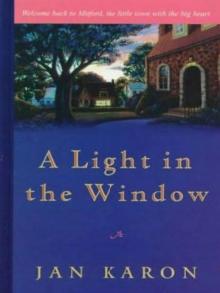 A Light in the Window
A Light in the Window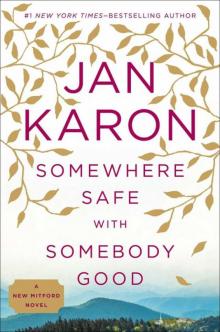 Somewhere Safe With Somebody Good
Somewhere Safe With Somebody Good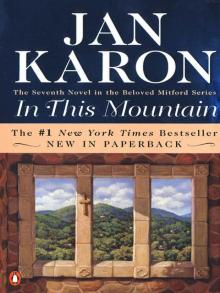 In This Mountain
In This Mountain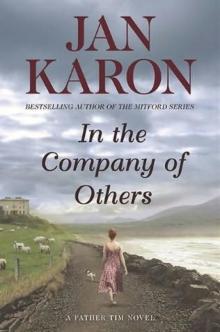 In the Company of Others
In the Company of Others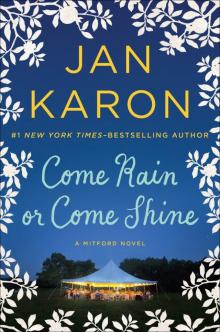 Come Rain or Come Shine
Come Rain or Come Shine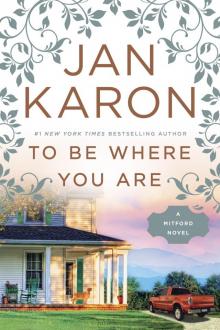 To Be Where You Are
To Be Where You Are These High, Green Hills
These High, Green Hills Light From Heaven
Light From Heaven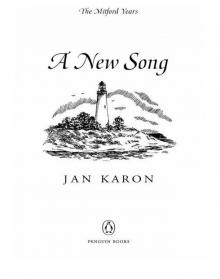 A New Song
A New Song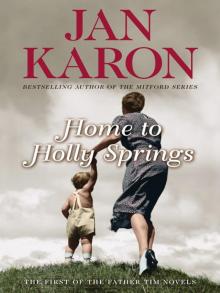 Home to Holly Springs
Home to Holly Springs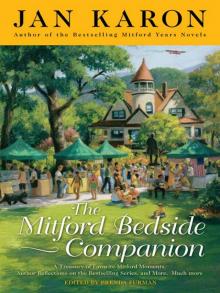 The Mitford Bedside Companion
The Mitford Bedside Companion At Home in Mitford
At Home in Mitford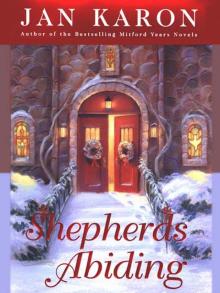 Shepherds Abiding
Shepherds Abiding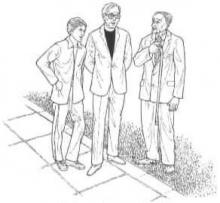 Out to Canaan
Out to Canaan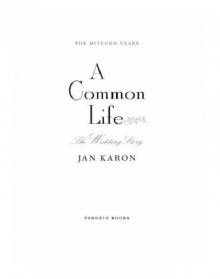 A Common Life: The Wedding Story
A Common Life: The Wedding Story Jan Karon's Mitford Years
Jan Karon's Mitford Years